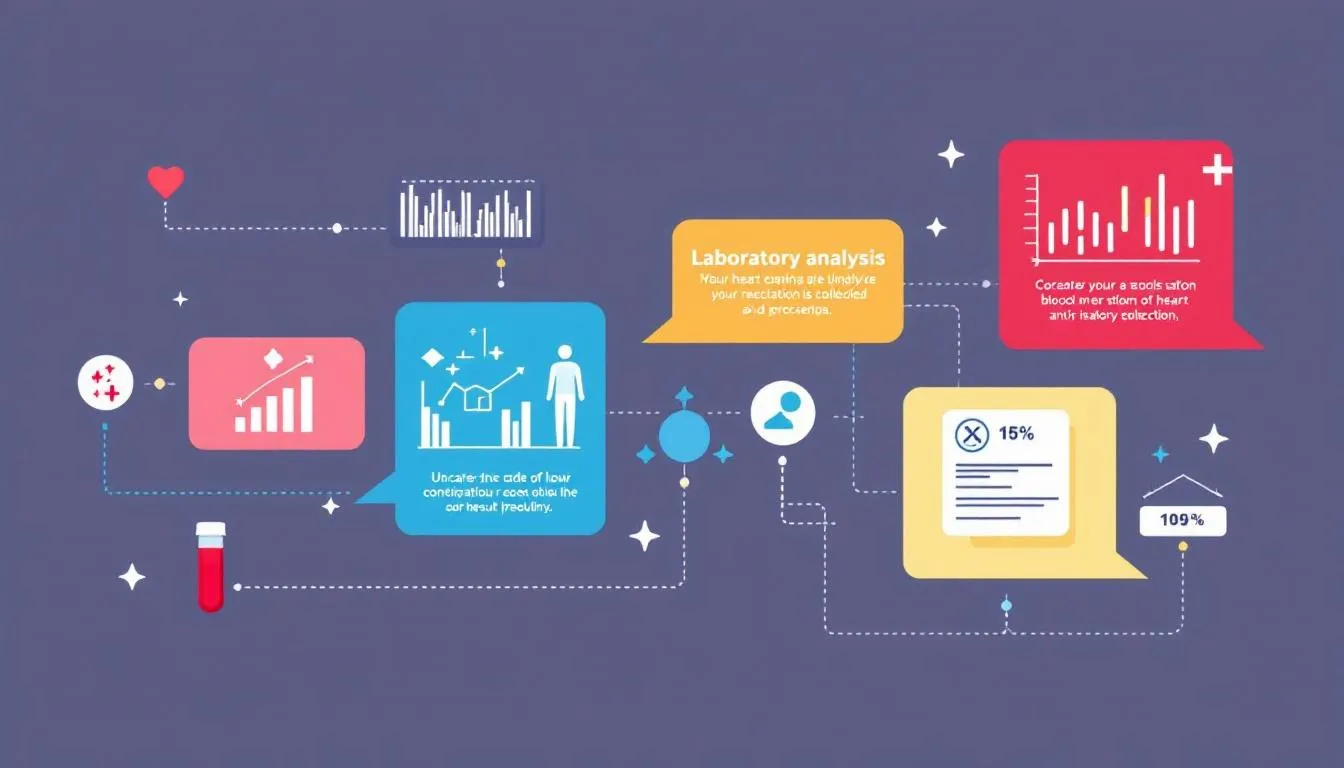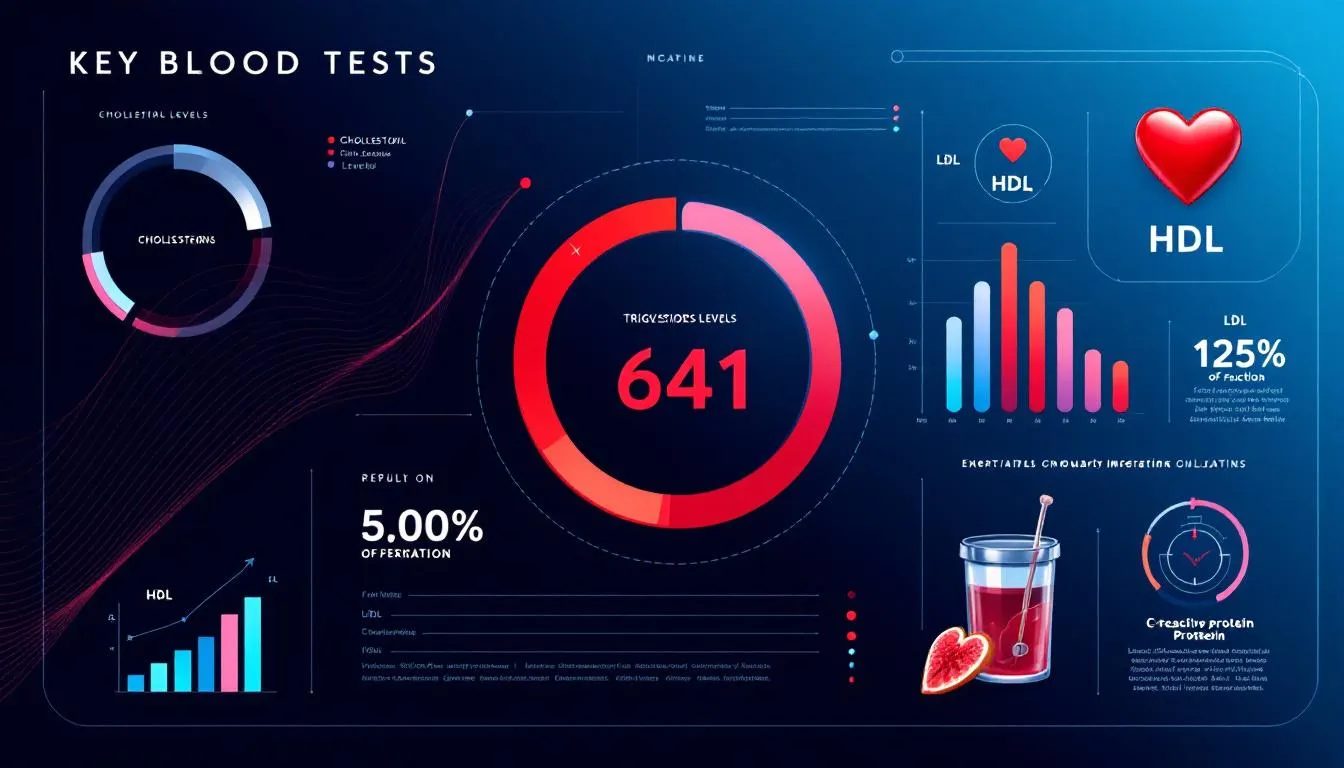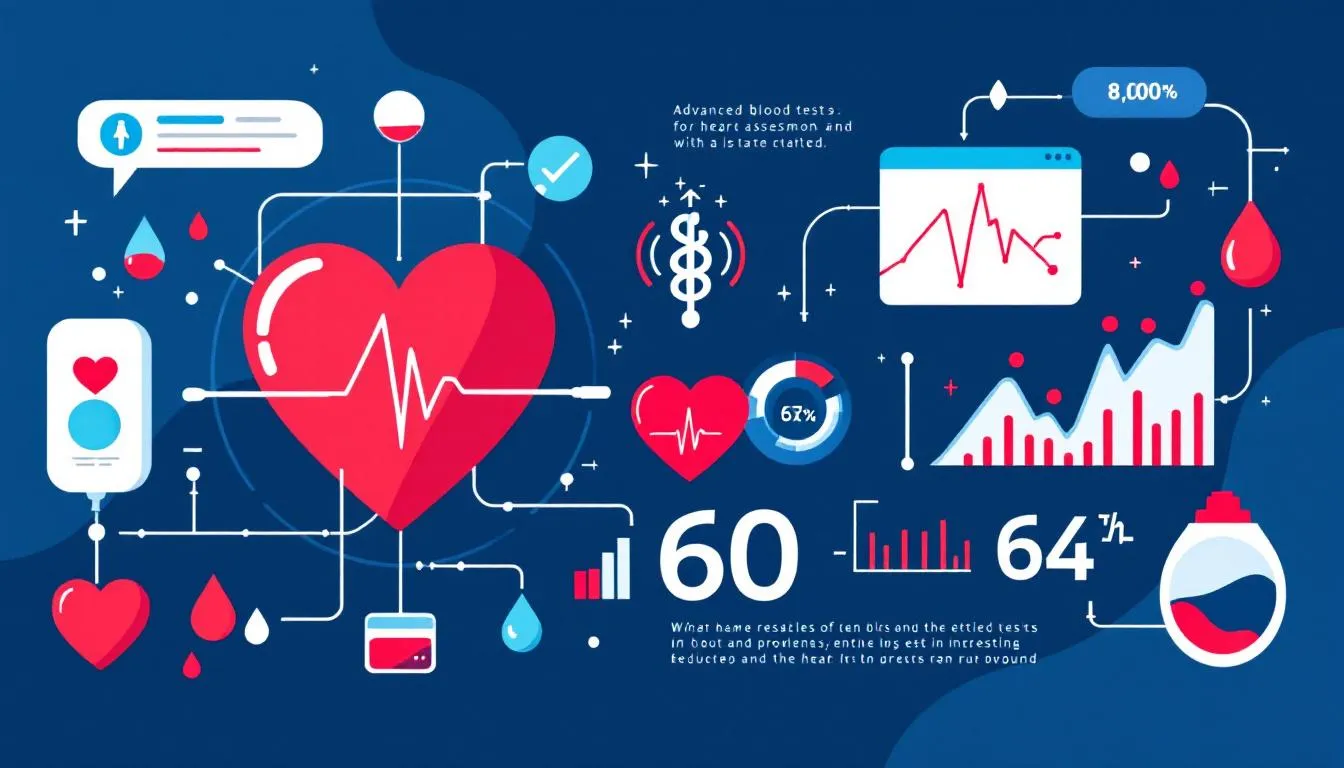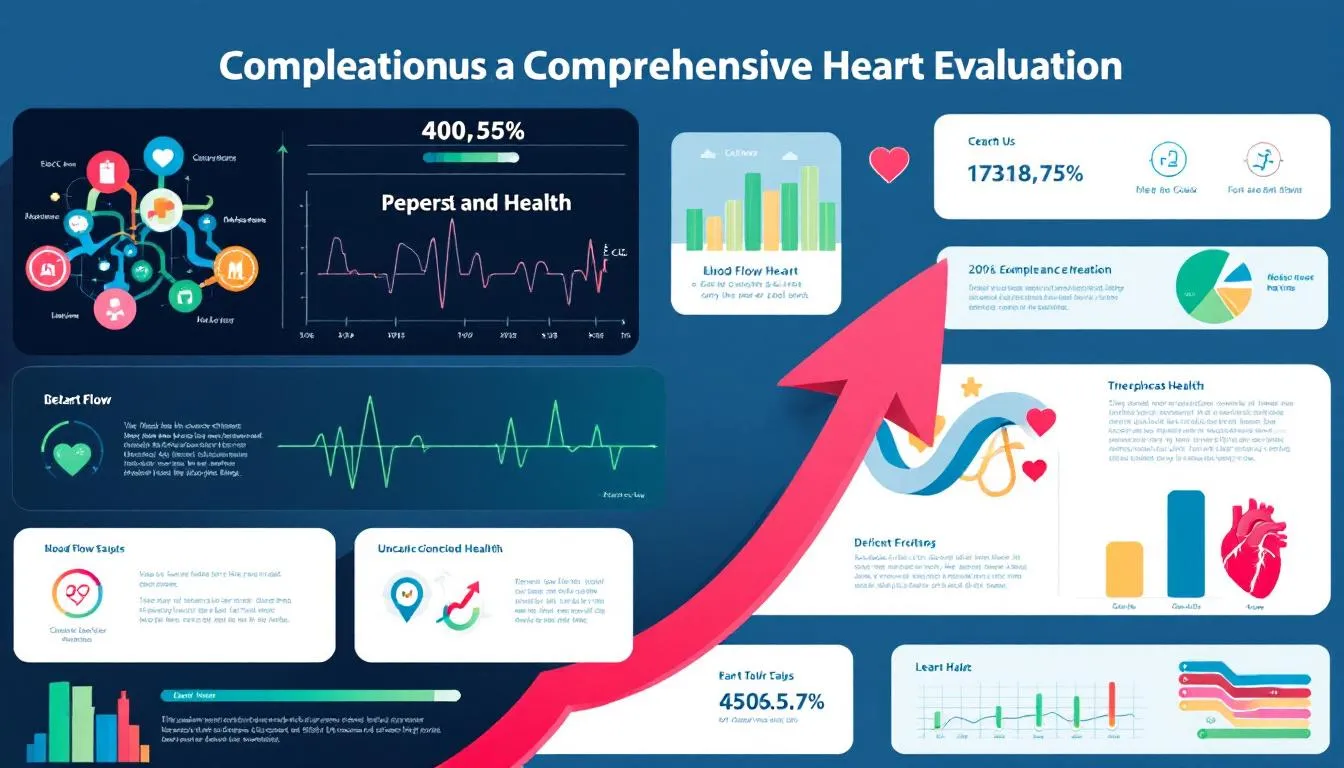A heart blood test is essential for diagnosing and monitoring heart health. These tests measure substances in the blood to identify heart disease or other conditions affecting cardiovascular health. This article will break down what these tests entail, why they are important, and what you can expect during the process.
Key Takeaways
- A heart blood test assesses health markers related to heart conditions, aiding in diagnosis and management.
- Common blood tests, including cholesterol, CRP, and troponin tests, provide critical information for evaluating heart disease risk.
- Recognizing symptoms and understanding family history are essential in determining the necessity for heart blood tests.
What is a Heart Blood Test?

A heart blood test is a procedure where a small sample of blood is collected to assess various health markers related to the heart. The test measures different substances in the blood that can indicate the presence of heart disease or other conditions affecting the heart and blood vessels. These tests are essential for ruling out other causes of heart symptoms, monitoring existing conditions, and evaluating the effectiveness of medications. Heart blood tests play a crucial role in diagnosing and managing heart health by identifying risk factors such as high cholesterol, hypertension, and diabetes.
People with risk factors like:
- high blood pressure
- high cholesterol
- smoking
- a family history of heart disease should consider getting a heart blood test. These tests help:
- diagnose heart conditions
- monitor the effects of treatment and lifestyle changes related to cardiovascular disease.
The British Heart Foundation emphasizes the importance of these tests in understanding the health and functioning of the heart and coronary arteries.
How Blood Samples Are Taken
Blood testing typically involves the following steps:
- Drawing blood from a vein, usually from the inside of the elbow or the back of the hand.
- Placing a tight band, or tourniquet, around the upper arm to make the veins more visible and easier to access.
- Inserting a needle into the vein to draw the blood.
This process usually takes only a few minutes.
After the blood sample is collected, pressure is applied to the site to prevent blood clots and minimize bruising.
Key Blood Tests for Heart Health

Heart blood tests are invaluable in providing critical information about lipid levels and biomarkers that can indicate heart disease risk. Common tests for heart health include cholesterol tests, CRP tests, and troponin tests, which collectively help in diagnosing conditions like atherosclerosis and monitoring heart health. Elevated cholesterol or inflammatory markers in the blood can signal potential heart problems, making these blood tests essential in early detection and management of heart diseases.
Specialized blood tests offer deeper insights into heart health, aiding in the early detection of diseases such as coronary artery disease and heart failure. Understanding the results of these tests can significantly impact treatment decisions and lifestyle changes to improve heart health.
Let’s explore some of the key blood tests for heart health in more detail.
Cholesterol Levels
A cholesterol blood test measures the fats in your blood, including total cholesterol, HDL (high density lipoprotein hdl), low density lipoprotein ldl, and triglycerides. Total cholesterol levels greater than 200 mg/dL are considered high and increase the risk of heart disease. HDL cholesterol, often referred to as “good” cholesterol, should be above 40 mg/dL for men and 50 mg/dL for women to be protective against heart disease.
For optimal heart health:
- LDL cholesterol, known as “bad” cholesterol, should be below 100 mg/dL. Maintaining a healthy ldl level is crucial.
- Triglycerides should ideally be under 150 mg/dL to reduce additional health risks.
- Non-HDL cholesterol, calculated by subtracting HDL from total cholesterol, is a key marker for assessing heart disease risk.
Regular monitoring of these cholesterol levels through blood tests can help manage and reduce the risk of cardiovascular issues.
High-Sensitivity C-Reactive Protein (CRP)
High sensitivity crp tests are used to measure the level of CRP in your blood, which is an indicator of inflammation in the body. Key points about hs-CRP include:
- CRP is produced by the liver in response to inflammation.
- Elevated CRP levels can indicate a higher risk of heart disease.
- A hs-CRP level greater than 2.0 mg/L is associated with a higher risk of cardiovascular events.
Monitoring CRP levels can help in identifying and managing inflammation-related heart conditions.
Troponin Tests
Troponin T is a protein found in heart muscle, and elevated troponin level in the blood can indicate heart muscle damage. Troponin tests are especially important for diagnosing heart attacks, as high levels of troponin T are a clear indicator of heart muscle injury.
A high-sensitivity troponin T test can detect even small amounts of this protein, making it a vital tool for early diagnosis and management of heart attacks.
Advanced Blood Tests for Detailed Heart Assessment

In certain situations, more detailed blood tests are required to provide a comprehensive assessment of heart health. These advanced tests can identify specific biomarkers that offer deeper insights into the risk and progression of heart disease. For individuals experiencing symptoms like chest pain or persistent fatigue, advanced blood testing can be crucial in diagnosing underlying heart conditions.
Recognizing symptoms like:
- shortness of breath
- irregular heartbeats is crucial for timely intervention. Advanced blood tests offering critical information for managing and treating heart diseases include:
- Lipoprotein (a)
- plasma ceramides
- natriuretic peptides.
Let’s delve into these advanced tests.
Lipoprotein (a)
Lipoprotein (a) is a type of lipoprotein that is genetically influenced and can indicate an increased risk of heart disease. Unlike other cholesterol levels, Lipoprotein (a) is not affected by lifestyle changes. High levels of Lipoprotein (a) can predispose individuals to cardiovascular issues, making it an important marker for those with a family history of heart disease.
Plasma Ceramides
Plasma ceramides are lipids found in the bloodstream that can predict heart disease risks. Elevated ceramide levels correlate with tissue health and metabolic conditions, providing insights into the likelihood of developing cardiovascular diseases.
Monitoring these levels through blood tests can help in early detection and management of heart health issues.
Natriuretic Peptides
B-type natriuretic peptide (BNP) is a key biomarker used in heart blood tests to assess heart strain. Elevated BNP levels indicate heart failure or increased stress on the heart.
BNP tests are instrumental in diagnosing and managing heart failure, making them essential for comprehensive heart assessments.
When to Get a Heart Blood Test

Recognizing the early symptoms of heart disease can significantly impact treatment options and outcomes. Blood tests can reveal crucial information about heart health and indicate risks for heart failure or atherosclerosis. Early recognition and timely intervention are key in managing heart health effectively.
It’s essential to monitor symptoms alongside blood test results to manage heart health proactively. By understanding when to get a heart blood test, individuals can take preventive measures to maintain their heart health and avoid severe complications.
Let’s explore the factors that necessitate a heart blood test.
Family History and Genetic Factors
A family history of heart disease can significantly increase an individual’s risk, making early blood testing crucial. If a close relative was diagnosed with heart disease early, the likelihood of developing similar conditions is higher.
Healthcare professionals may order an Lp(a) test to assess risks even if cholesterol levels are healthy, emphasizing the importance of considering family medical history in heart health management.
Symptoms Indicating Heart Issues
Symptoms such as chest pain, shortness of breath, and irregular heartbeats should prompt immediate consideration for blood tests related to heart health. These symptoms can indicate underlying heart problems like coronary artery disease or heart failure.
Recognizing these signs and getting timely blood tests can lead to early diagnosis and better management of heart conditions.
What to Expect During and After the Test
Undergoing a heart blood test involves a straightforward procedure that typically lasts only a few minutes. The process includes:
- Taking the blood sample from the inside of the elbow.
- Applying pressure to the site after the draw to minimize bleeding and bruising.
- Staying hydrated and resting to help prevent dizziness or fainting after the test.
Avoid heavy lifting on the arm used for the blood draw to prevent complications like swelling. Apply pressure to the site for a few minutes to reduce bruising. Knowing what to expect during and after the test can alleviate anxiety and ensure a smooth experience.
Managing Anxiety and Discomfort
Managing anxiety and discomfort during blood tests can make the experience more bearable. Having a friend or family member with you can provide emotional support and reduce anxiety.
Deep breathing techniques and staying warm before the test can improve blood flow and ease the process.
Understanding Your Results
Understanding your blood test results is crucial for managing heart health. If you haven’t received your results within a couple of weeks, it’s advisable to call your healthcare provider. Any bruising from the blood test typically subsides within a few days, but if you experience any unusual symptoms, contact your healthcare provider immediately.
Additional Tests for Comprehensive Heart Evaluation

In addition to blood tests, several other diagnostic tests can provide a more thorough assessment of heart health. These tests include:
- Echocardiograms
- Electrocardiograms (ECG)
- Stress tests These tests offer detailed insights into the heart’s function and structure. Combining these tests with blood tests ensures a comprehensive evaluation of heart health.
A coronary angiogram, for instance, provides real-time images of blood flow in the heart, revealing artery blockages and heart muscle function. Similarly, a thallium scan shows blood flow to the heart muscle, which is crucial for assessing coronary artery disease and the coronary arteries supplying blood. Additionally, magnetic resonance imaging can be used to evaluate the overall condition of the heart.
Let’s explore these additional tests in more detail.
Echocardiogram
An echocardiogram is an ultrasound scan of the heart that uses high-frequency sound waves to create detailed images of the heart’s structure and function. The procedure is painless and involves applying jelly to the chest while a probe is moved around to capture images.
This test helps in assessing the heart’s chambers, valves, and overall performance.
Electrocardiogram (ECG)
An electrocardiogram (ECG) records the electrical activity of the heart and helps identify problems with the heart’s rhythm or heart rhythm rate. The procedure takes about 5-10 minutes and involves attaching electrodes to the chest, arms, and legs.
For a more extended analysis, a 24-hour ambulatory ECG can be used, where the monitor records the heart’s activity over an entire day. This test is crucial for diagnosing abnormal heart rhythms and other heart conditions.
Stress Tests
Stress tests evaluate how well the heart performs under physical exertion, providing insights into blood supply and heart function during increased activity. An echocardiogram can be performed with stress testing to assess blood supply to the heart muscle during exercise.
Nuclear cardiac stress tests use a radioactive substance to visualize blood flow to the heart during both rest and exertion, offering a detailed view of heart function.
Ensuring Accurate and Reliable Test Results
Ensuring accurate and reliable blood test results requires proper preparation and adherence to guidelines provided by healthcare professionals. Before the test, it’s essential to follow specific instructions such as fasting or avoiding certain medications, as even minor deviations can impact the results.
The blood collection process involves using a tourniquet to engorge veins, making them easier to puncture, and disinfecting the site to prevent infections. Adhering to these preparation and collection protocols significantly increases the likelihood of obtaining accurate and reliable test results.
Following healthcare provider guidelines meticulously can make a substantial difference in the outcomes of blood tests and subsequent treatment plans for a health care professional.
Pre-Test Preparations
Fasting for 8 to 12 hours before certain blood tests, like cholesterol panels, is often necessary for precise measurements. Patients taking medications should consult their doctor about whether to continue them before the test, as adjusting or temporarily halting certain medications can be crucial for accurate blood test results.
Following these pre-test preparations ensures that the results are as accurate and reliable as possible.
Post-Test Care
Post-test care is essential to avoid complications like bruising or fainting after a blood test. To ensure a smooth post-test experience:
- Apply pressure to the site for several minutes after the test to minimize bruising.
- Stay hydrated.
- Rest to help improve recovery and reduce the likelihood of fainting.
Summary
Heart blood tests are indispensable tools in diagnosing, monitoring, and managing heart health. From basic cholesterol tests to advanced assessments like Lipoprotein (a) and plasma ceramides, these tests provide comprehensive insights into heart health. Recognizing symptoms and understanding when to get tested can lead to early detection and better management of heart conditions. By following pre-test preparations and post-test care guidelines, individuals can ensure accurate and reliable results. Taking proactive steps in heart health management can significantly improve quality of life and reduce the risk of severe heart conditions.
Frequently Asked Questions
Why is a heart blood test important?
A heart blood test is crucial for diagnosing heart conditions and monitoring health, as it measures substances in the blood that reflect heart health and predict potential risks. Regular testing can play a key role in proactive heart care.
What should I expect during a heart blood test?
You can expect a quick procedure where a blood sample is drawn from a vein, typically in the elbow area, taking only a few minutes. Following the test, pressure will be applied to the site to help reduce the risk of bruising.
What are the key blood tests for heart health?
Key blood tests for heart health include cholesterol tests, high-sensitivity C-reactive protein (CRP) tests, and troponin tests, as they assess lipid levels, inflammation, and heart muscle damage. Monitoring these parameters is essential for maintaining cardiovascular health.
When should I consider getting a heart blood test?
You should consider getting a heart blood test if you have risk factors such as high blood pressure or cholesterol, a family history of heart disease, or if you experience symptoms like chest pain or shortness of breath. Taking proactive steps in monitoring your heart health is essential.
How can I ensure accurate blood test results?
To ensure accurate blood test results, it is essential to follow pre-test instructions, including fasting if required, and consult your doctor regarding any medications. Additionally, proper post-test care, like applying pressure to the site and staying hydrated, is important.
